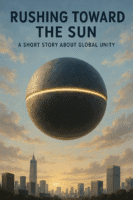Rushing Toward the Sun C01
by MarineTLChapter One
【At 5 p.m. on October 22, the Joint Military Command Base launched the T3 Satellite. The satellite experienced a severe explosion when it was 3,500 kilometers from the moon. This marks the third exploratory satellite launched globally in the past three months, all of which have ended in failure.】
“Failed?”
“Failed again…”
…
On the afternoon of October 23, 2037, Luo Xiaowen had just entered the classroom when he heard classmates discussing the recent lunar spaceship incident.
The spaceship event had occurred three months earlier: July 12, Friday.
Luo Xiaowen remembered that day clearly—it was the day summer homework was assigned. He was discussing weekend plans with friends when suddenly, the sky outside the classroom went completely dark.
“A spaceship!” a student shouted from the playground.
The shout sent a shock through the entire school. All fifty-plus students in Luo Xiaowen’s class rushed out and crowded at the railing to peer outside. Overhead was a massive ‘Lead Sphere’ flying above the school. It was a thousand meters in diameter, dark gray, covered in impact marks, and looked like something straight out of a sci-fi alien movie.
“My god!”
“It’s huge!”
…
The students stared at the Lead Sphere in shock. It hovered above their school, blocking out all sunlight—it felt like the end of the world.
“Get back to class!”
“No one is allowed on the playground or in the corridors!”
“Back inside!”
…
Luo Xiaowen wanted to keep watching the Lead Sphere, but teachers and homeroom instructors came rushing out. They didn’t care what grade anyone was in—if they saw students outside, they herded them back into classrooms. Luo Xiaowen, a fourth-grader in Class Five, was jostled into Class Six in the chaos.
“Is that a spaceship?”
“Are aliens here?”
“Are there really aliens?”
…
The classroom was full of fourth-grade students, all buzzing nervously and excitedly about the Lead Sphere outside. Many even opened the windows to get a better look but were quickly scolded by the teacher.
Ten minutes later, the Lead Sphere disappeared from above Linzhou City.
At 5 p.m., Luo Xiaowen’s parents came to pick him up from school. His mother was an advertising manager and his father a director at the water conservancy bureau. Normally, both were too busy to pick him up, leaving it to his grandparents. This time, however, both of them had come together—a rare occurrence.
“How was school today? Were you hurt?” His mother, Sun Jingjuan, hugged him tightly as soon as she saw him.
“No, the teachers assigned summer homework. In the afternoon, we saw a huge Lead Sphere—everyone said it was a spaceship!” Luo Xiaowen recounted excitedly.
“It flew right over our school.”
“It was bigger than the schoolyard.”
…
Other students were also leaving school at that time, all chattering about what they had seen that afternoon.
“As long as you’re safe,” Sun Jingjuan said with relief.
At 7 p.m., the national news broadcast reported on the Lead Sphere.
The Lead Sphere had first appeared over Australia at 1 p.m. and traveled at speeds ranging from 300 to 7,000 km/h, circling most of the Earth. It was an undisguised, purposeful flight. After orbiting the planet, it was now headed toward the moon.
“Your dad went out to buy groceries. Stay home for the next few days—don’t go anywhere,” Sun Jingjuan said after dinner as she laid out the plan.
Online and in community group chats, everyone was discussing the Lead Sphere. From the moment it entered Earth’s orbit to when it left, a total of three hours and fifty-two minutes had passed. Luo Xiaowen, still young, was more curious than afraid upon seeing the spaceship, but most ordinary people and governments reacted with caution.
Since ancient times, people had speculated—through mysticism or science—about the existence of aliens and anticipated the moment of their discovery. But the underlying assumption was that such contact would be “safe” and “controlled.” The Lead Sphere had appeared blatantly in Earth’s skies that afternoon, and then scrutinized the planet without disguise—
During this period, the United Nations had sent signals to try and stop the Lead Sphere’s actions, but there was no response. It was observing Earth the way humans observe ants.
The Lead Sphere’s arrival had been so sudden, and since it didn’t display hostile behavior, countries and the allied military maintained the highest level of alert but refrained from using weapons. And so, the ship patrolled for over three hours and then left—for now.
“The supermarket was packed—couldn’t even get vegetables or noodles,” Luo Dongjun said at 10 p.m. as he came home carrying large bags. The alien spaceship news had gone global, and fearing an alien invasion, people had stormed local supermarkets. He had managed to grab just one bag of dried vegetables and a box of instant noodles.
“Ugh.” Sun Jingjuan looked worriedly at the dried vegetables on the table. As an ordinary citizen, all she hoped was for the spaceship to circle once and leave. Aliens or not, she just wanted a peaceful life.
Over the next two days, the spaceship dominated the news worldwide.
After leaving Earth, it didn’t exit the solar system but instead parked itself above the moon. The moment it arrived, all signals between the Earth and the moon were lost: the aliens had seized the moon.
The spaceship resembled a giant Lead Sphere, and the government officially named it the Lead Sphere spaceship.
Following its arrival on the moon, the United Nations convened an emergency meeting and established the Special Command Base for Alien Spaceship. The command base had the authority to mobilize certain resources without compromising national interests to prepare for potential interstellar conflict.
While setting up the command base, astronomers attempted to observe the moon.
But all Earth-based and space station observation technology was blocked—they could see nothing of the moon’s surface.
After the initial tension passed, a tacit standoff formed between the two sides, giving Earth some breathing room for military planning.
Now, three months had passed since the Lead Sphere spaceship first appeared. During that time, it had remained stationed on the moon. Earth had launched three exploratory satellites.
Today was the third. And clearly, it had failed again.










0 Comments